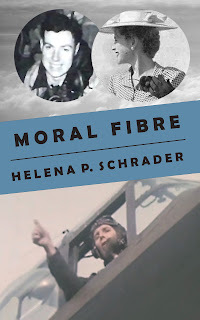Dissecting a Novel - Part I - The Idea
A novel is a complex creature.
It has a creator. It has many interconnected parts that cannot live independently of one another. It has characteristics that enable it to be categorized. It has unique qualities that defy categorization. It grows and it may thrive or die. It can be loved and hated, and it can be killed.
I have often compared my novels to my children for I create them, yet they have a life of their own and are not always biddable. I share in their successes and failures and I love them all despite their weakness and flaws.
And every novel starts with an idea -- a flash of inspiration.
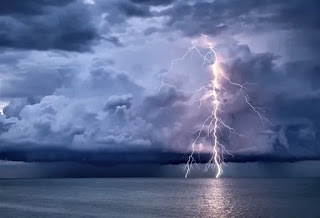
Berlin was home for a quarter century and so more than a third of my life. I'd come because I was researching the German Resistance to Hitler, but I'd stayed after my book on the Resistance was finished. The Berlin Wall came down. Germany was unified. I worked for the Privatization Agency (die Treuhandanstalt). I married. I stayed. Berlin became home.
I was researching and writing other books -- about Sparta and the Crusades and the Battle of Britain -- but the history of Berlin surrounded me in all its complexity every day. It was part of me. It was perhaps inevitable, therefore, that as I finished my book on the Battle of Britain, I was drawn to that moment in history when British and American airmen came to the assistance of my adopted city, Berlin.
I submitted a book proposal to the History Press in the UK suggesting a non-fiction review of the Berlin Airlift for the 60th Anniversary in 2008. They liked the idea and commissioned the work, paying a respectable advance. In addition to the usual scholarly research, I contacted as many eye-witnesses of the Airlift as possible. Living in Berlin made it easy to find Germans who remembered the eleven months of Soviet siege, including children who had been evacuated on the "Air Bridge." I was privileged to correspond with the famous "candy bomber," Gail Halvorsen, who generously shared his memories. I also traveled to the UK to meet with several British participants, and received letters from many others. It was a fantastic and fun project and the book that resulted, The Blockade Breakers, has been my best-selling book with nearly 8,000 copies sold.
Yet the idea of combining characters from my German Resistance novel with characters from my Battle of Britain novel came as one of those flashes of inspiration that I have come to love and trust. It struck me instantly as exciting, usual and full of opportunities for a great novel.
Indeed, too many opportunities! The sheer magnitude and complexity of the topic daunted me and I put the project aside to pursue easier topics and stories. It was not until I had returned to the Battle of Britain, released a revised edition of Where Eagles Never Flew and those characters were again vivid in my consciousness that I ventured to return to the idea of a Berlin Airlift book.
I had hardly started, however, before I realized that it was impossible to tackle this topic in a single book, so the book became a series, Bridge to Tomorrow, of which Cold Peace is only the beginning.
Cold Peace is Book I of the Bridge to Tomorrow Series.
Three years after WWII, Europe struggles with rationing, widespread unemployment and a growing Soviet threat. Hitler's former capital lies ruined under the joint control of wartime allies bitterly at odds. With the currency worthless, the population lives on hand-outs or turns to crime and prostitution. Deep inside the Soviet Zone of occupation, Berlin appears to be an ideal target for a communist take-over, putting the defenders of democracy on a collision course with Stalin's merciless aggression.
A Battle of Britain ace, a female air traffic controller, a concentration camp survivor and an ex-ATA woman pilot are just some of those trying to find their place in the post-war world. An air ambulance service offers a shimmer of hope, but when a Soviet fighter brings down a British passenger liner, Berlin becomes a flashpoint. The world stands poised on the brink of World War Three.
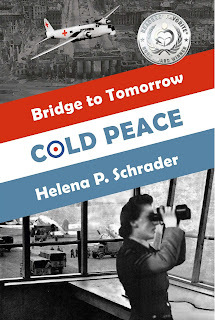
Find out more at: https://www.helenapschrader.com/bridg...
View a video teaser at: https://www.youtube.com/watch?v=JTuE7...
Previous releases include:
" MORAL FIBRE," which WON THE HEMINGWAY AWARD 2022 FOR 20TH CENTURY WARTIME FICTION and a MAINCREST MEDIA AWARD FOR MILITARY FICTION as well as being A FINALIST FOR THE BOOK EXCELLENCE AWARD 2023 IN THE CATEGORY HISTORICAL FICTION.
Riding the icy, moonlit sky,they took the war to Hitler.
Their chances of survival were less than fifty percent.
Their average age was 21.
This is the story of just one bomber pilot, his crew and the woman he loved.
It is intended as a tribute to them all.
or Barnes and Noble.
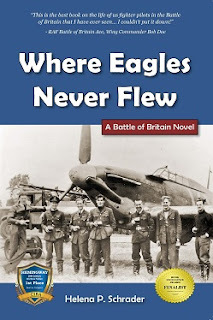 "This is the best book on the life of us fighter pilots in the Battle of Britain that I have ever seen.... I couldn't put it down."-- RAF Battle of Britain ace, Wing Commander Bob Doe.
"This is the best book on the life of us fighter pilots in the Battle of Britain that I have ever seen.... I couldn't put it down."-- RAF Battle of Britain ace, Wing Commander Bob Doe.
Winner of a Hemingway Award for 20th Century Wartime Fiction, a Maincrest Media Award for Military Fiction and Silver in the Global Book Awards.
Find out more at: https://crossseaspress.com/where-eagles-never-flew
For more information about all my books visit: https://www.helenapschrader.com
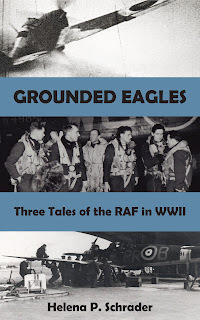 Disfiguring injuries, class prejudice and PTSD are the focus of three tales set in WWII by award-winning novelist Helena P. Schrader. Find out more at: https://crossseaspress.com/grounded-eagles
Disfiguring injuries, class prejudice and PTSD are the focus of three tales set in WWII by award-winning novelist Helena P. Schrader. Find out more at: https://crossseaspress.com/grounded-eagles

